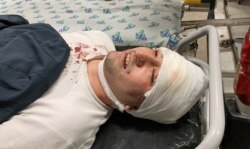A Polish journalist who had accused an Uzbek official of harassment and written critically about the country was denied entry to Uzbekistan on Sunday.
The journalist told VOA she was held at the Uzbek border with Kazakhstan for more than a day before state security took her to Tashkent airport, from where she flew to Istanbul.
"They took me to Tashkent airport under surveillance," Agnieszka Pikulicka-Wilczewska said as she waited for a flight to Poland. "I don't understand why I was banned from entering Uzbekistan, but I will try to get an official response."
Uzbek authorities have not commented publicly on the incident. The Uzbek embassy in Washington did not respond to VOA's request for comment, sent late Tuesday.
Pikulicka-Wilczewska has worked for international outlets including Al-Jazeera, The Guardian, The Diplomat and Eurasianet, and she was one of the few foreign journalists working in Uzbekistan.
But she has run into issues with authorities.
Pikulicka-Wilczewska said that earlier this year, the Foreign Ministry rejected several requests to extend her press accreditation. She also alleged that one of the ministry officials was sexually harassing her and pressuring her to write positive articles.
The Foreign Ministry apologized and extended her media accreditation for three months. It said it had dismissed the official, Radio Free Europe/Radio Liberty reported at the time.
But in June, the ministry said it would not extend the accreditation again because of "violations of legislation."
The country's Interior Ministry also accused the journalist of bias and not abiding by laws after she reported on an attack against blogger and gay rights activist Miraziz Bazarov.
Bazarov was hospitalized with serious injuries after being beaten in Tashkent in March. Pikulicka-Wilczewska interviewed him and later criticized law enforcement on social media.
In response, the Interior Ministry issued a statement accusing the journalist of trying to discredit law enforcement through false news and violating the country's media laws. [[ https://tashkenttimes.uz/national/6683-interior-ministry-accuses-foreign-journalist-of-abusing-freedom-of-media ]]
Pikulicka-Wilczewska denies any wrongdoing.
When she spoke with VOA, she said she had planned to continue her work in Uzbekistan, which included writing a book about the environment under President Shavkat Mirziyoyev.
When she was stopped at the border, Pikulicka-Wilczewska tweeted, "I came to Uzbekistan over 3yrs ago hoping that change was possible. I'm leaving convinced that under current government no systemic change will ever take place."
Uzbekistan has a poor press freedom record, ranking 157th out of 180 countries, where 1 is freest, according to Reporters Without Borders.
Freedom of expression is limited, but bloggers and social media users are finding more space to take on issues deemed off limits under the late President Islam Karimov's rule.
President Mirziyoyev has said that "many local officials don't like sharp and critical content" in the media but that "openness and freedom of speech are the demand of the times, the demand of the reforms in Uzbekistan."
This article originated in VOA's Uzbek Service.





